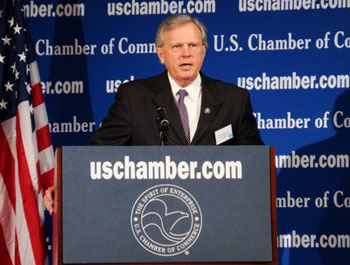
The keynote speaker at Friday’s Space Economy Symposium, held at the US Chamber of Commerce headquarters in downtown Washington, was Congressman Parker Griffith (D-AL), whose committee assignments include the House Science and Technology Committee’s space subcommittee and the Small Business Committee. That combination appeared to make sense given the subject matter of the half-day event, but Griffith showed that, just a little more than two months after taking office, he’s still working his way up the learning curve of space issues, particularly in the commercial sector.
Griffith’s speech stuck to some space policy basics: concerns about ceding the “high ground” of space to other countries, including China and India, and the challenges of convincing Congress and the general public to support (and increase the funding for) space programs. At one point he raised a few eyebrows when he said America’s position in space depended “particularly on funding from the US Congress. Only governments can really afford space.” That was a rather odd comment given the number of people in the room who do business in, and make money from, space, without relying on the Congress for funding. Asked about that comment in the Q&A session that followed his speech, he amended his comments somewhat. “Fundamental research has to come out of the government and then our private sector will partner with us as a government to improve it and make it more ubiquitous, so to speak.”
Later in the Q&A came the topic that is almost inevitable in any discussion of commercial space policy in the US these days: export control, or ITAR. “Can you comment about your thought on ITAR and the ability for US companies to sell products overseas?” someone asked. Griffith had a blank look on his face. The questioner, and others in the audience, repeated and elaborated on the question: you know, ITAR, export control restrictions, that sort of thing? “Is that a ‘Buy America’?” he asked. “I’m not quite sure.” He did go on to say that many space technologies today can be bought “off the shelf” and thus he didn’t think export controls were enforceable (were that only true, some companies in the audience were no doubt thinking.) “I’m not as up to answering that as maybe I should be,” he finally admitted.
No doubt there are plenty of people and industry groups that would be happy to bring Griffith up to speed on ITAR (especially since he seemed inclined not to restrict such technologies). Ironically, one group that likely won’t be able to do that is the US Chamber’s Space Enterprise Council, one of the co-sponsors of Friday’s event. An article that will appear in next week’s issue of Space News reports that the US Chamber of Commerce is disbanding the council, effective May 1, for unspecified reasons. [temporary link]
Well, at least it’s better to have someone who doesn’t have a firm position on the issue and is educable, than someone who knows something for damned sure that’s wrong.
The Congressman certainly has some homework to do but he will certainly understand that those in the space industry see it hindering there business when he studies ITAR.
[…] Rep. Griffith, let’s introduce you to ITAR […]
[…] Rep. Griffith, let’s introduce you to ITAR – Space Politics […]
When we introduce him to ITAR, we need to be sure that he understands that it means a whole lot more than selling ready-made military hardware to evil foreign governments.
Bigelow’s publicized dealings with the ITAR regime is somewhat representative, but only the beginning.
ITAR, as constituted, essentially makes anything remotely related to spaceflight into restricted information. This obviously kills foreign sales of hardware, even to friendly nations. Beyond that, it impairs domestic collaboration. Interchange about completely civilian projects between American companies can’t go by email, lest some “technical data” be hijacked by eavesdroppers, creating an illegal export. Don’t tell your mother what you do because she might tell someone else, who might tell someone else, who might be a “foreign person”, who might well be a US citizen, thereby creating an illegal export.
Try presenting a paper at a conference these days. Good luck getting it past the corporate ITAR review process. No sensible company would dare let anyone write a significant paper, for fear of the ITAR thicket. Corporations are cowed because the ITAR regs are so vague but the punishments can be so extreme. No one is going to take a chance.
Curiously, the only people who can present anything significant are government employees, who are somewhat insulated form the ITAR insanity. There’s sort of a limit to what the ITAR enforcerment regime can do to them.
Many fields are stagnating in the US because nobody in any other country (even Canadians) will collaborate with a US citizen. Instead of becoming part of a significant international effort we are restricted to our own little block, while everyone else moves ahead.